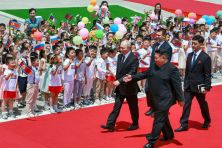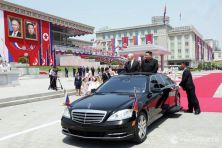President Vladimir Putin’s visit to North Korea comes at a crucial time for global relations and signifies a significant shift in geopolitical...
Vous n'êtes pas connecté
- English
- Français
- عربي
- Español
- Deutsch
- Português
- русский язык
- Català
- Italiano
- Nederlands, Vlaams
- Norsk
- فارسی
- বাংলা
- اردو
- Azərbaycan dili
- Bahasa Indonesia
- Հայերեն
- Ελληνικά
- Bosanski jezik
- українська мова
- Íslenska
- Türkmen, Түркмен
- Türkçe
- Shqip
- Eesti keel
- magyar
- Қазақ тілі
- Kalaallisut ; kalaallit oqaasii
- Lietuvių kalba
- Latviešu valoda
- македонски јазик
- Монгол
- Bahasa Melayu ; بهاس ملايو
- ဗမာစာ
- Slovenščina
- тоҷикӣ ; toğikī ; تاجیکی
- ไทย
- O'zbek ; Ўзбек ; أۇزبېك
- Tiếng Việt
- ភាសាខ្មែរ
- རྫོང་ཁ
- Soomaaliga ; af Soomaali
Rubriques :
 Maroc - EURASIAREVIEW.COM - A la une - 25/Jun 23:58
Maroc - EURASIAREVIEW.COM - A la une - 25/Jun 23:58
Putin’s Visit To North Korea And The Geopolitical Landscape Of Northeast Asia – Analysis
By He Jun On June 19, Russian President Vladimir Putin arrived in Pyongyang for a two-day visit to North Korea. Following this, Putin is also scheduled to visit Vietnam. In the wake of the Russia-Ukraine war, the West has imposed joint sanctions aimed at isolating Russia, severely impacting its geopolitical and geo-economic space. Against this backdrop, Putin's visit to China in May, his current visit to North Korea, and the upcoming visit to Vietnam are all aimed at expanding Russia's geopolitical and geo-economic influence. Based on public reports, it appears that Putin's visit to North Korea has achieved a series of results. The most significant among them is the signing of the "comprehensive strategic partnership” treaty between Russian President Putin and North Korean leader Kim Jong Un. During the talks with Kim Jong Un, Putin stated that Russia is fighting against the “hegemonic, imperialist policies” of the United States and its allies over decades. He said that Russia appreciates North Korea’s “consistent and unwavering support for Russian policy, including in the Ukrainian direction”. Putin also added that Russia has prepared “a new basic document for the establishment of long-term relations with North Korea”. Meanwhile, Kim Jong Un remarked that in a complex and rapidly changing world, North Korea is strengthening its strategic communication with Russia and its leadership. He affirmed that North Korea will “unconditionally support all of Russia’s policies”. Putin emphasized the importance of the treaty signed between the two countries, stating that this document will serve as the foundation for further development in the bilateral relationship. He stated that "the comprehensive partnership agreement signed today provides, among other things, for mutual assistance in the event of aggression against one of the parties to this agreement”. Putin also hinted at the possibility of military technology cooperation with North Korea. Kim Jong Un, commenting on the signing of the treaty between North Korea and Russia, remarked that the agreement accelerates the construction of a new multipolar world and that the relations between North Korea and Russia have been elevated to the level of an alliance. This points to the indications that while the relationship between Russia and North Korea has not yet reached a true military alliance, it is close enough to be one. In today's world system, both Russia and North Korea face multiple sanctions from the U.S. and its Western allies. Enhancing bilateral relations between Russia and North Korea allows them to provide each other with geopolitical space and expand cooperation in economic, technological, and military aspects. If Russia were to provide military technology to North Korea, it would undoubtedly conflict with United Nations sanctions, not to mention those imposed by the U.S. However, against the backdrop of Russia's confrontation with the West, such actions may not face significant additional repercussions. It is noteworthy that Putin's visit to North Korea this time could potentially have a significant impact on the geopolitical landscape of Northeast Asia, particularly through possible military cooperation. Putin has already stated that he does not rule out military technology cooperation with North Korea. South Korea has previously stated that from August 2023 to February 2024, North Korea shipped a total of 6,700 containers of weapons and ammunition to Russia. Ukraine has alleged that Russia launched KN-23/24 series missiles manufactured by North Korea. The Center for Strategic and International Studies (CSIS) also released a report claiming that North Korea transferred a large amount of military hardware to Russia. However, both Russia and North Korea have denied these claims, dismissing them as "absurd”. If North Korea has indeed risked the ire of the West by supplying military equipment to Russia, what would Russia provide in return? From North Korea's needs and geopolitical logic, Russia has numerous military cooperation options — advanced military aircraft, missile technology, and most worryingly, nuclear technology, all of which are potential concerns for the West. According to reports, on June 14 this year, U.S. Deputy Secretary of State Kurt Campbell expressed in an urgent phone call with South Korean First Vice Foreign Minister Kim Hong-kyun that the U.S. had information on what Pyongyang has provided to Moscow but was uncertain about what North Korea received in return from Russia. "Hard currency? Is it energy? Is it capabilities that allow them to advance their nuclear or missile products? We don't know. But we're concerned by that and watching carefully”, Campbell stated. In the already highly tense geopolitical situation of Northeast Asia, a North Korea with enhanced nuclear capabilities would significantly alter the geopolitical landscape of the region, especially causing discomfort within the U.S. and its allies like Japan and South Korea. In the past, as a military power with European aspirations, Russia would not have engaged in such close cooperation with North Korea or expended significant geopolitical and military resources. However, the current situation is different; even if the Russia-Ukraine conflict were to end soon, Russia under Putin's leadership would continue to face prolonged containment, pressure, and accountability from the West. Therefore, Russia has abandoned any fantasies of restoring short-term relations with the West. Under such circumstances, Russia's pivot to the East focuses on cooperation with both China and North Korea. The relationship between Russia and China constitutes a cooperation between two major powers, having upgraded to a "comprehensive strategic partnership of coordination for a new era", which differs somewhat from the "comprehensive strategic partnership" akin to an alliance between Russia and North Korea. During the Russia-Ukraine war, China has explicitly stated it will not provide lethal weapons to Russia, emphasizing instead non-military cooperation, particularly in the economic domain. On the other hand, Russia's cooperation with North Korea presents a distinct scenario. As mentioned earlier, military cooperation could become a crucial component of such a bilateral relationship. There are concerns that Northeast Asia will revert to the geopolitical landscape of over 70 years ago. In the early 1950s, during the Korean War, Northeast Asia witnessed a standoff between " Russia-China-North Korea" versus "U.S.-Japan-South Korea", which later evolved into the current state of tense equilibrium through the brutal Korean War. More than seven decades later, could we see a resurgence of a similar dynamic? Analysts from ANBOUND suggest that fundamentally, there are similarities with the past: Russia, China, and North Korea are all viewed by the U.S. as adversaries to varying degrees, representing different challenges in American eyes. That being said, there are significant differences between now and the past. China has undergone over forty years of reform and opening up primarily towards the West, becoming the world's second-largest economy. Its continued development still necessitates maintaining its reform and opening up policies. Despite being a small and impoverished nation, North Korea possesses an undisclosed number of nuclear weapons. The once powerful Soviet Union, which was a pole in the world, has since shrunk to become today's Russia after its dissolution. For China, its comprehensive strategic interests today are vastly different from the past. Therefore, China's adherence to neutrality and its efforts to promote peace talks during the Russia-Ukraine war aligned well with its strategic interests. The future development of Russia-North Korea relations, especially progress in military technology cooperation, and the depth of such cooperation will become a significant variable in the geopolitical landscape of Northeast Asia. Complicating matters, the deepening of Russia-North Korea relations is closely related to Russia's confrontation with NATO. NATO Secretary General Jens Stoltenberg, who has always advocated for NATO's globalization, stated that Putin's visit to North Korea confirms Russia's relationships with countries like China, Iran, etc., which demonstrates that the “security is not regional, it's global”. This viewpoint largely reflects NATO's geopolitical ideas towards Asia, especially Northeast Asia. Final Analysis Conclusion: Russia's strengthening of its quasi-alliance relationship with North Korea will bring about significant changes to the geopolitical situation in Northeast Asia. China, as a crucial stakeholder in Northeast Asia, will need to anticipate and study various potential changes in the region's situation. He Jun is Director of China Macro-Economy Research Center and Senior Researcher at ANBOUND, an independent think tank.
Articles similaires
Kim declares ‘full support’ for Russia’s war in Ukraine, vows to deepen cooperation
In Pyongyang, North Korean leader Kim Jong-un supported Russian dictator Vladimir Putin in his war in Ukraine and pledged to strengthen strategic...
A Nuclear Calculus? The Security Risks And Diplomatic Challenges Of Russia-North Korea Alliance – OpEd
In June 2024 the formalisation of a strategic partnership between Russia and North Korea emerged as a pivotal development far with far-reaching...
Putin Arrives In North Korea, Vows To Boost Cooperation With North Korea
By Taejun Kang Russian President Vladimir Putin arrived in North Korea in the wee hours Wednesday for a meeting with counterpart Kim Jong Un,...
Geopolitical Shift: Russia and North Korea Forge “Comprehensive Strategic Partnership”
Ahead of President Vladimir Putin’s visit to its Asian neighbor, Russia has announced the preparation of an “Agreement on a The post Geopolitical...
North Korea’s Kim Hails Russia Alliance, Promises Putin Support On Ukraine
By Taejun Kang North Korean leader Kim Jong Un hailed a “new, high level of alliance” with Russia on Wednesday as he promised President...
Russia-North Korea Defense Pact Moves Military Cooperation Out Of Shadows
By Christy Lee A new defense pact signed between Russia and North Korea this week publicly laid out Moscow's willingness to engage in...
Russian President Vladimir Putin in Hanoi after inking North Korea defence pact
Hanoi, Vietnam — Russian President Vladimir Putin begins a state visit to Vietnam on Thursday, a day after signing a mutual defence pact with North...
Putin and Kim sign defence pact in Pyongyang
Russia's and North Korea's dictators have signed a comprehensive strategic partnership agreement, which, among other things, includes security...
Russia’s Post-War Dilemmas In Ukraine – OpEd
In regard of the war in Ukraine, Russia’s main challenge going forward is to find the equilibrium between strategic overestimation and...
Les derniers communiqués
-
Adobe Brings Conversational AI to Trillions of PDFs with the New AI Assistant in Reader and Acrobat
Adobe - 21/02/2024
-
Laura Frigenti takes the Helm as Chief Executive Officer of the Global Partnership for Education
Global Partnership for Education - 05/12/2022



